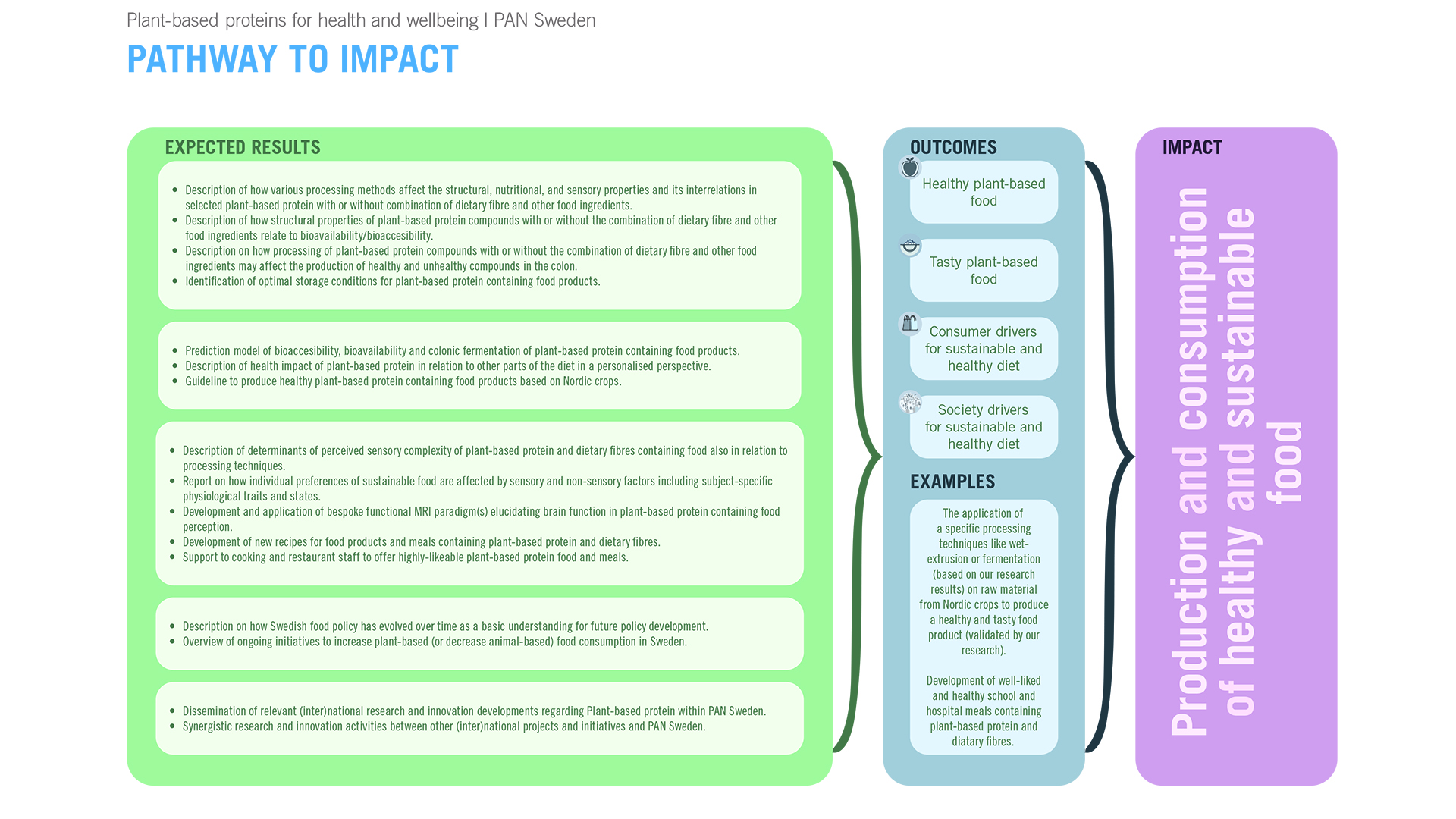PAN Sweden Research Centre advocates for sustainable health through plant-based proteins, focusing on their health benefits and sensory qualities, aiming to make sustainable food the preferred choice.
Efforts to limit the environmental impact of animal-based food include a shift towards the production and consumption of plant-based proteins. However, plant-based proteins may, in certain aspects, be considered inferior to animal-based ones with respect to their health effects and perceived taste.
PAN Sweden’s goal is to clarify the relationship between the processing, structure, bioavailability, digestion, and fermentation of proteins and dietary fibre and health effects in terms of gut, metabolic, and mental health. Furthermore, sensory and consumer behaviour aspects, as well as how policy, strategies, and regulations can support the transition towards plant-based proteins, are also studied.
The core approach is the continuous development and application of a comprehensive and integrated model and method ‘toolbox’ that facilitates innovations within plant-based products and dietary fibre with proven benefits for health and wellbeing and contributes to increasing consumer acceptance of novel plant-based products.
Vision and mission
PAN Sweden’s vision is that ‘Sustainably produced food with health benefits is the consumer’s preferred choice.’ Our mission is to contribute to the realisation of this vision with research-based knowledge, especially related to plant-based proteins in combination with dietary fibre, and this knowledge will be broadly applied in society. This knowledge, as well as the competence and human capital raised by PAN Sweden, will boost the transition of the food system towards more sustainability from an environmental, social and economic perspective. This necessitates a real interdisciplinary approach, but also integrative intersectoral action of academic and non-academic research organisations, industry, as well as public and civic sector, adapted to various target groups.
Challenges
In light of the ongoing transformation of the food system towards more plant-based products, a number of major challenges have been identified that PAN Sweden will address.
First
Although the shift towards plant-based proteins is very positive from an environmental and climate sustainability perspective, the health impact of the consumption of plant-based proteins is still not adequately investigated and is very much dependent on the specific ingredient and product as well as the biological characteristics of the individual consumer. PAN Sweden strives to elucidate the relationship between various plant-based proteins, dietary fibre and individual well-being, especially related to the gut, metabolic and mental health.
Second
Especially in northern European countries, a sustainable and resource-effective transformation in the entire plant-based protein food chain should focus on Nordic crops, its proteins, and other ingredients such as dietary fibre. The potential downside of these crops is that they often naturally contain anti-nutrients, and products based on these crops used to have a particular bitter taste, which is not appreciated by all consumers. PAN Sweden’s research and activities are addressing these issues in order to understand how various processing techniques, as well as the addition and/or integration of dietary fibre, affect the nutritional and sensory value of Nordic plant-based protein food products.
Third
A successful transition towards plant-based proteins necessitates an interdisciplinary approach that integrates food, nutritional, and consumer science. PAN Sweden has shown that this approach can be realised in a Swedish setting, and we are eager to valorise on that in a broader global perspective.
It is our strong belief that this comprehensive access to various disciplines and their infrastructure is a pivotal prerequisite to successfully achieving societal impact. Hence, our partners comprise academic and non-academic organisations as well as industry and small- and intermediate-sized enterprises, as well as the public and civic sectors covering both food producers and consumers. Together, we have a broad understanding of the needs and challenges of the various sectors. Furthermore, we utilise this to integrate fundamental and applied research.
PAN Sweden contributes to training new generations of researchers to meet the complex and interrelated challenges in food and nutritional sciences related to plant-based proteins. We achieve this by allocating the tasks of our early career researchers in the interphase between the various disciplines and work packages.
Fourth
We focus our research on plant-based proteins in direct relation to dietary fibre as we believe this combination will improve their health impact.
PAN Sweden’s conceptual design integrates food-, nutrition- and social sciences from an interdisciplinary and intersectoral perspective. Development and application of the toolbox enables a mix of both pre-competitive and competitive research. Novel minimally invasive techniques, such as breath analysis as a proxy of gut microbiota function, wide-scale metabolomics based on a dried blood spot sample by a simple fingerstick, and sophisticated functional neuroimaging, will enable a personalised health approach. A combination of individual biomedical and sensory perception measures will provide a deep insight into how plant-based products can improve health from a personalised perspective. Additionally, we engage in political science and regulatory aspects related to transitioning from animal-based to a more plant-based protein consumption.

Pathway to impact
The results from the research projects in PAN Sweden are directly related to the results listed in the left column in the figure above. These are cornerstones to achieve the outcomes, which will be generated within a four-year period and fostered afterwards by our communication, knowledge transfer and dissemination activities. Impact resembles the wider long-term effects of PAN Sweden on society in general and aligns with our vision and the aims of the National Research Programme for Food. This impact encompasses both our contribution to strengthening the competitiveness of a food system in transition as well as our contribution to improved public health.
Please note, this article will also appear in the 20th edition of our quarterly publication.









